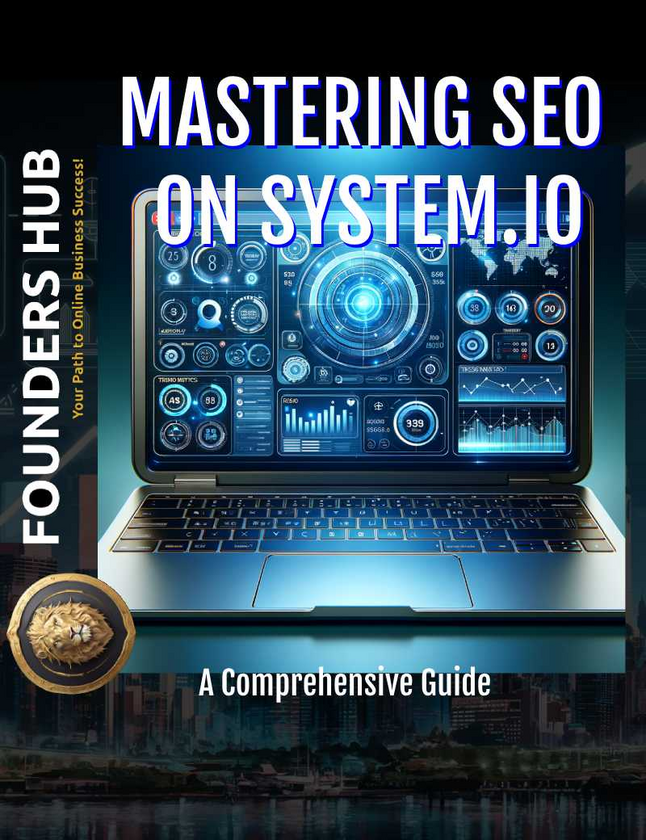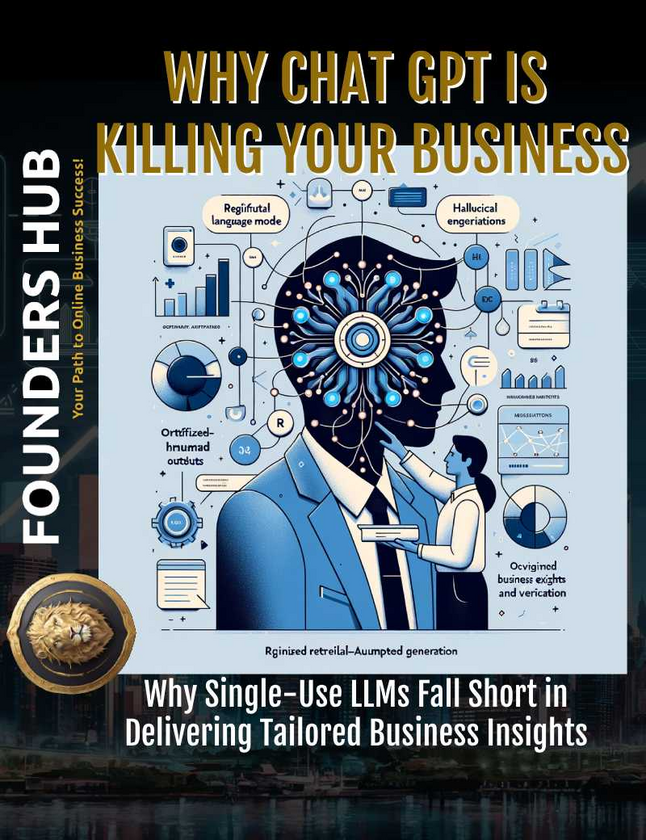In today's digital landscape, search engine optimization (SEO) has become an indispensable aspect of any successful online business strategy. By optimizing your website and content for search engines, you can drive targeted traffic, increase conversions, and ultimately boost your bottom line. For businesses utilizing the powerful Systeme.io platform, understanding and implementing effective SEO techniques is crucial for maximizing your online visibility and reach.
Key Takeaway: SEO is a vital component of digital marketing, helping businesses attract relevant traffic, build brand authority, and drive conversions. This comprehensive guide will equip you with the knowledge and strategies to master SEO on Systeme.io, ensuring your content and landing pages rank higher in search engine results.
Introduction
Importance of SEO for Business
In the ever-evolving digital world, having a strong online presence is no longer a luxury but a necessity for businesses of all sizes. With billions of searches conducted daily, optimizing your website and content for search engines can unlock a vast pool of potential customers actively seeking your products or services. By ranking higher in search engine results pages (SERPs), you not only increase your visibility but also establish credibility and trust with your target audience.
SEO is a crucial component of any effective digital marketing strategy, driving targeted traffic and conversions to your website. By understanding and implementing SEO best practices, you can outrank competitors, attract qualified leads, and ultimately grow your business.
Key Elements for High Search Engine Rankings
While search engine algorithms are complex and constantly evolving, several key elements influence your website's ranking in search results. These include:
- Relevant and High-Quality Content: Search engines prioritize websites that provide valuable, informative, and engaging content tailored to user intent.
- Keyword Optimization: Strategically incorporating relevant keywords throughout your content, meta descriptions, and headlines can significantly improve your visibility for specific search queries.
- Backlinks: High-quality backlinks from reputable websites act as "votes of confidence," signaling to search engines that your content is authoritative and trustworthy.
- Site Speed and User Experience: Search engines favor websites that load quickly and provide a seamless user experience across all devices.
- Technical SEO: Factors such as site architecture, mobile-friendliness, and structured data markup can impact your search engine visibility and rankings.
Systeme.io, a powerful all-in-one marketing platform, offers a range of features and tools to help businesses optimize their online presence and achieve higher search engine rankings. By leveraging Systeme.io's capabilities, you can create expert content, craft compelling meta descriptions and headlines, balance content quality with translations, and optimize landing pages for maximum impact.
Creating Expert Content
Definition and Benefits
Expert content, also known as authoritative or high-quality content, is a crucial component of any successful SEO strategy. It refers to content that provides in-depth, valuable insights and actionable advice on a specific topic, backed by research and expertise. Expert content is characterized by its originality, accuracy, and ability to address the needs and concerns of your target audience effectively.
Creating expert content offers numerous benefits for your business, including:
- Establishing Brand Authority and Trust: By consistently delivering high-quality, informative content, you position your brand as a trusted authority in your industry, building credibility with your audience.
- Improving Search Engine Rankings: Search engines prioritize websites that provide valuable, relevant content, rewarding them with higher rankings in search results.
- Increasing Engagement and Conversions: Expert content that resonates with your target audience can lead to higher engagement rates, longer dwell times, and ultimately, more conversions.
According to a study by Demand Metric, 61% of consumers make purchasing decisions based on custom content. This statistic underscores the importance of creating expert content that addresses the specific needs and concerns of your target audience.
How to Create Expert Content
Creating expert content requires a strategic approach and a deep understanding of your target audience. Here are some key steps to follow:
Research and Understand Your Target Audience: Conduct thorough market research to identify the pain points, challenges, and interests of your target audience. This insight will inform the topics and angles you cover in your content.
Focus on Original, Valuable Insights and Actionable Advice: Rather than regurgitating information readily available online, strive to provide unique perspectives, practical tips, and actionable advice that genuinely helps your audience solve their problems or achieve their goals.
Use Authoritative Sources and References: Back up your claims and assertions with credible sources, research studies, and expert opinions. This adds credibility and reinforces the authority of your content.
Incorporate Multimedia Elements: Enhance your content with relevant images, videos, infographics, and other visual elements to improve engagement and make complex topics more accessible.
Optimize for Search Engines: While prioritizing quality and value, ensure that your expert content is optimized for search engines by incorporating relevant keywords, meta descriptions, and internal linking strategies.
By consistently creating expert content tailored to your target audience's needs and optimized for search engines, you can establish your brand as a trusted authority, improve your search engine rankings, and drive more qualified traffic to your Systeme.io website.
Crafting Compelling Meta Descriptions and Headlines
Meta Descriptions
Meta descriptions are concise summaries that appear in search engine results, providing users with a glimpse of what a particular web page is about. While meta descriptions do not directly impact search engine rankings, they play a crucial role in influencing click-through rates (CTR) – the percentage of users who click on your listing after seeing it in search results.
Crafting compelling meta descriptions is essential for improving your CTR and driving more targeted traffic to your Systeme.io website. Here are some tips for writing effective meta descriptions:
- Keep it Concise: Meta descriptions should be no longer than 160 characters, as search engines typically truncate longer descriptions.
- Include Primary Keywords: Incorporate your primary keywords naturally into the meta description to increase relevance and visibility for specific search queries.
- Evoke Excitement and Showcase Benefits: Use persuasive language that piques the reader's interest and highlights the benefits or value proposition of your content.
- Avoid Duplicate or Boilerplate Descriptions: Each page should have a unique, relevant meta description that accurately reflects its content.
- Optimize for Featured Snippets: Structure your meta descriptions in a way that increases the chances of being featured as a rich snippet or answer box in search results.
Headlines
In addition to meta descriptions, compelling headlines play a crucial role in grabbing attention and improving your content's visibility in search engine results. Headlines are often the first thing users see, and they can significantly impact whether someone clicks through to your content or moves on to the next result.
When crafting headlines for your Systeme.io content, keep these tips in mind:
- Be Clear and Concise: Headlines should be direct and to the point, accurately reflecting the content's topic or main idea.
- Use Power Words: Incorporate attention-grabbing words like "ultimate," "proven," or "essential" to create a sense of urgency or importance.
- Include Keywords: Naturally incorporate relevant keywords into your headlines to improve visibility for specific search queries.
- Evoke Curiosity or Promise a Solution: Headlines that pique the reader's curiosity or promise to solve a specific problem can be highly effective in driving clicks.
- Test and Refine: Experiment with different headline variations and monitor their performance to identify the most effective formulas for your audience.
Internal Linking
Internal linking is the practice of linking to other relevant pages or content within your Systeme.io website. This not only improves the user experience by providing easy access to related information but also plays a crucial role in SEO.
Effective internal linking can:
- Distribute Page Authority: By linking to other pages on your site, you can distribute the authority and ranking power of your high-performing pages, potentially boosting the visibility of other content.
- Improve Crawlability and Indexing: Internal links help search engine crawlers discover and index all the pages on your website more efficiently.
- Enhance User Experience: Well-structured internal linking helps users navigate your site more easily, reducing bounce rates and increasing dwell time – factors that can positively impact your search engine rankings.
When implementing internal linking on your Systeme.io website, follow these best practices:
- Link to Relevant and Authoritative Pages: Ensure that your internal links point to pages that are highly relevant and valuable to the user's current context.
- Use Descriptive Anchor Text: Utilize descriptive and keyword-rich anchor text that accurately reflects the content of the linked page.
- Avoid Excessive or Irrelevant Linking: Too many internal links or links to irrelevant pages can dilute the authority and relevance of your content.
- Monitor and Update Links: Regularly audit your internal links to ensure they are still valid and pointing to the correct pages.
By crafting compelling meta descriptions, attention-grabbing headlines, and implementing effective internal linking strategies, you can improve your content's visibility, click-through rates, and overall user experience – all of which contribute to better search engine rankings and increased traffic to your Systeme.io website.
Balancing Content Quality and Translation
Focus on Quality Content
In the realm of SEO, content quality is paramount. Search engines prioritize websites that provide valuable, informative, and engaging content tailored to user intent. Keyword stuffing, thin or low-quality content, and other black hat SEO tactics are not only ineffective but can also result in penalties or lower rankings.
When creating content for your Systeme.io website, focus on delivering quality over quantity. Here are some tips to help you maintain high content quality:
- Thorough Research and Planning: Conduct extensive research to ensure your content is accurate, up-to-date, and addresses the specific needs and concerns of your target audience.
- Proper Formatting and Structure: Use clear headings, subheadings, and bullet points to improve readability and make your content more scannable.
- Multimedia Inclusion: Incorporate relevant images, videos, infographics, and other multimedia elements to enhance the user experience and make complex topics more accessible.
- Proofreading and Editing: Carefully proofread and edit your content to ensure it is free from grammatical errors, typos, and inconsistencies.
- Originality and Depth: Strive to provide unique insights, in-depth analysis, and actionable advice that sets your content apart from competitors.
By prioritizing quality over quantity and catering to both user and search engine needs, you can create content that resonates with your audience, establishes your brand as a trusted authority, and ultimately improves your search engine rankings.
Role of Translations in SEO
In today's globalized world, translating your content into multiple languages can be a powerful strategy for reaching a wider audience and improving your SEO efforts. By offering translated content, you can cater to diverse user bases, tap into new markets, and potentially rank for relevant keywords in different languages.
Translated content can be rich in SEO keywords, allowing you to target specific search queries and stand out from competitors who only offer content in a single language. However, it's important to approach translations strategically and ensure that the quality and accuracy of the translated content are maintained.
Here are some strategies for effectively leveraging translations in your Systeme.io SEO efforts:
- Prioritize High-Quality Translations: Invest in professional translation services or native speakers to ensure that your content is accurately and naturally translated, preserving the original meaning and nuances.
- Cultural Adaptation: Go beyond literal translations by adapting your content to the cultural context and norms of your target audience, ensuring that it resonates and connects with them effectively.
- Keyword Research and Optimization: Conduct keyword research for each target language and optimize your translated content accordingly, incorporating relevant keywords and phrases.
- Separate URLs and Metadata: Use separate URLs and metadata (titles, descriptions, etc.) for each language version of your content to avoid potential duplicate content issues and improve relevance.
- Promote and Link Translations: Promote your translated content through targeted marketing campaigns and link between language versions to facilitate user navigation and search engine crawling.
By striking a balance between high-quality content creation and strategic translations, you can expand your reach, cater to diverse audiences, and potentially improve your search engine visibility and rankings across multiple languages and markets.
Landing Page Optimization
Keyword Strategy and Long-Tail Keywords
Effective keyword research and implementation are essential components of any successful SEO strategy, including optimizing landing pages on Systeme.io. By identifying and targeting the right keywords, you can improve your visibility for relevant search queries and attract qualified traffic to your website.
While targeting broad, high-volume keywords can be tempting, it's often more effective to focus on long-tail keywords – more specific, descriptive phrases that better align with user intent. Long-tail keywords tend to have lower search volumes but higher conversion rates, as they attract users who are further along in the buying cycle and actively seeking specific solutions.
When optimizing your Systeme.io landing pages, consider the following strategies:
- Conduct Thorough Keyword Research: Use tools like Google Keyword Planner, Ahrefs, or SEMrush to identify relevant long-tail keywords with high search volumes and moderate competition.
- Understand User Intent: Analyze the intent behind specific search queries to ensure that your landing page content aligns with what users are seeking.
- Optimize Page Elements: Incorporate your target keywords naturally into page titles, headings, meta descriptions, body content, and image alt text.
- Monitor and Refine: Continuously monitor your landing page performance and refine your keyword strategy based on user behavior and search engine rankings.
By targeting the right long-tail keywords and optimizing your landing pages accordingly, you can improve your visibility for highly relevant search queries, attract qualified traffic, and ultimately increase conversions on your Systeme.io website.
Improving Load Speed
Page load speed is a critical factor in both user experience and search engine optimization. Slow-loading pages can lead to higher bounce rates, lower engagement, and ultimately, lower search engine rankings.
According to a study by Unbounce, 40% of users abandon a website if it takes longer than three seconds to load. This statistic highlights the importance of optimizing your Systeme.io landing pages for fast load times.
Here are some techniques you can implement to improve the load speed of your Systeme.io landing pages:
- Image Optimization: Compress and resize images to reduce file sizes without compromising quality, as large, unoptimized images can significantly slow down page load times.
- Minimize Plugins and Scripts: Evaluate the necessity of each plugin or script you're using and remove any unnecessary ones, as they can add overhead and slow down your pages.
- Clean and Minify Code: Ensure that your HTML, CSS, and JavaScript code is clean, well-structured, and minified (removing unnecessary spaces, comments, and formatting) to reduce file sizes and improve load times.
- Leverage Caching: Implement caching mechanisms to store static files (CSS, JavaScript, images) on the user's browser or a content delivery network (CDN), reducing the need to download these files repeatedly.
- Optimize for Mobile: Ensure that your landing pages are optimized for mobile devices, as slow load times on mobile can significantly impact user experience and search engine rankings.
By prioritizing page load speed and implementing these optimization techniques, you can provide a seamless user experience, reduce bounce rates, and potentially improve your search engine rankings on Systeme.io.
Building Authority and Trust with Backlinks
Backlinks, or inbound links from other websites, are a crucial factor in search engine algorithms and can significantly impact your website's authority and trust. Search engines view high-quality backlinks as endorsements or "votes of confidence" in the relevance and value of your content.
Building a strong backlink profile can help improve your search engine rankings, increase referral traffic, and establish your brand as a trusted authority in your industry. However, not all backlinks are created equal – it's essential to focus on acquiring high-quality, relevant backlinks from reputable sources.
Here are some strategies for building a strong backlink profile for your Systeme.io website:
- Guest Posting: Contribute high-quality, informative articles to reputable industry blogs or publications, including a contextual link back to your website.
- Partnerships and Collaborations: Collaborate with complementary businesses or influencers in your industry and explore opportunities for mutual link sharing or co-marketing initiatives.
- Content Marketing and Outreach: Create valuable, shareable content (e.g., infographics, guides, research studies) and reach out to relevant websites or publications to pitch content placements with backlinks.
- Directory and Citation Submissions: Submit your website to relevant, high-quality online directories and citation sources, ensuring consistent and accurate business information across the web.
- Broken Link Building: Identify broken links on authoritative websites and suggest replacing them with relevant links to your content, providing value to the site owner while earning a backlink.
When building backlinks, it's crucial to prioritize quality over quantity. Focus on acquiring backlinks from reputable, relevant sources that align with your industry and target audience. Additionally, ensure that your backlink profile appears natural and diverse, as search engines can penalize websites with excessive or manipulative link-building practices.
By implementing these strategies and building a strong, diverse backlink profile, you can enhance your website's authority and trust.



















